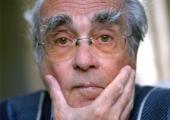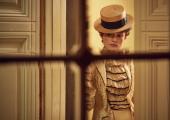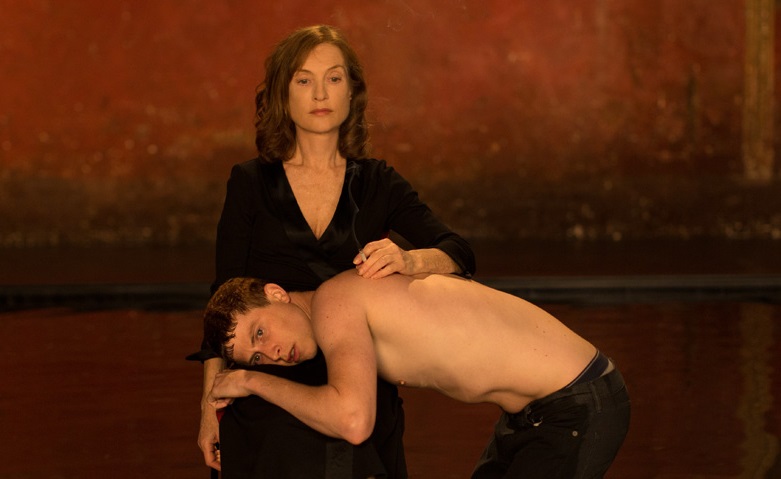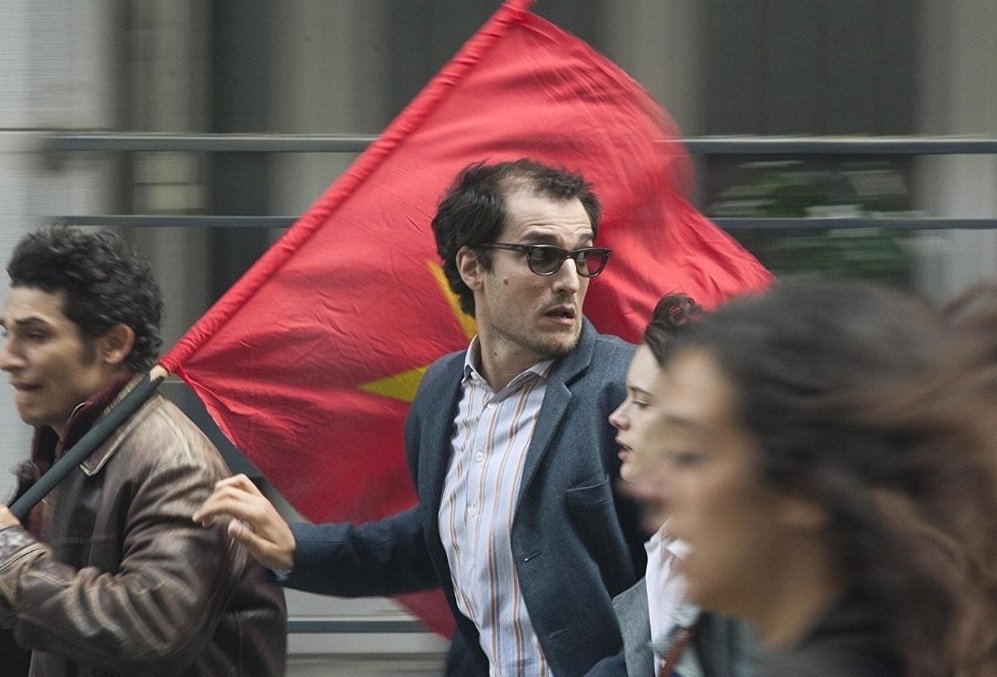theartsdesk Q&A: Composer Michel Legrand

He worked with everyone: the veteran composer tells his life story
“I want to be a man without any past,” said Michel Legrand, who has died at the age of 86. He had perhaps the longest past in showbiz. Orchestrator, pianist, conductor, composer of countless soundtracks, who else has collaborated as widely - with Miles Davis and Kiri Te Kanawa, Barbra Streisand and Jean-Luc Godard, Gene Kelly, Joseph Losey and Edith Piaf? When I visited him at his house at his splendid classical manoir 100km south of Paris, on the mantelpiece in the large white sitting room four familiar gilt statuettes stood sentry. The oldest was for “Windmills of My Mind”, the best original song of 1965.
A child prodigy at the piano, he converted from classical to jazz under the nose of his disapproving teacher, the composer Nadia Boulanger. Initially he worked as an orchestrator; his earliest triumph was I Love Paris, a set of jazz standards which sold seven million copies in two years. At 26 he recorded with Miles Davis, John Coltrane and Bill Evans. Then for 10 years he composed for the Nouvelle Vague directors, while his soundtracks from English-language films stretched from The Go-Between to Never Say Never Again via Portnoy's Complaint. Among his enduring works are musicals made for the screen. Les Parapluies de Cherbourg was an unexpected success in 1964, followed by Les Demoiselles de Rochefort (1967). He returned to the form in Yentl. Legrand’s Oscar for the score (the film’s only nomination) tells its own story.
Deep into his 70s he composed his first stage musical with Marguerite (2008), updating to occupied Paris the story familiar from La Traviata, Marguerite and Armand and sundry films. Then the Cornish theatre company Kneehigh retrieved The Umbrellas of Cherbourg from the archives. As Legrand’s classic score came alive again for a new audience, he looked back in a long biographical interview.
John Williams conducts Michel Legrand at the Boston Pops
JASPER REES: Do you approach music-making without any regard to genre? You’ve worked in so many different fields.
MICHEL LEGRAND: That makes me more than happy. I’ll tell you why. The Umbrellas of Cherbourg (pictured below: Joanna Riding in Kneehigh's stage version) and Yentl, two musicals, it seems to me that it’s impossible to say this is the same composer who made those two things. And people say, “Ja but we hear eight bars of your music and we recognise.” Bullshit. It’s friendly but it’s not true. I cannot eat the same meal every day. I cannot do the same thing every day all the year long. For instance in the Fifties I was an orchestrator and I was pretty famous. I worked with Barbra Streisand, I worked with people in America, in Paris. And then after 10 years of that work or nine years I started to be less interested because I have written so much so I started to be less good. And I said to myself, “OK, now I know I have to stop.”
So I stopped. I said, “No records any more, no nothing, forget me.”So for six months or a year I had no job, no money, no work, nothing. And one year later I was really lucky. There comes in France the New Wave of film directors. They wanted new people, new technicians, new everything. So we were two or three new musicians and I spent 10 years in the Sixties with the film directors, and had a great time. We started to shoot a movie without having any money, without even a producer, not knowing if they were going to pay anyone. I loved it. After 10 years I stated to be less interested, less good, and I thought I have to quit. So I called every director and said, “Forget me, I’m finished.” I called Jean-Luc Godard and said, “Jean-Luc, I don’t want to work, it’s over.” He said, “No no no, I’ve finished a movie, I want you to score it.” I said, “No, Jean-Luc, no, it’s over.” “No no!” I said, “I’ll do it but it’s the last time.”
 I flew to America. I had no work, so I rented a house and I waited and then one day I did The Thomas Crown Affair, first Oscar, a big success and after that it was easy for me to work there. And after a certain amount of years, same thing. I had enough. I don’t understand how even a composer for film, how can he devote his whole life. I don’t know how John Williams, whom I love very much... I said, “How can you do the whole of your life the same thing? I have to change, I have to move.” Something that I found a long time ago, when you’re not in danger, your work is not very interesting, because I can search for months if I have time, slowly, nicely, from 9am to 8pm and trying and writing. But when for instance like when I have to do Summer of 42 movie, it was Friday afternoon in Los Angeles. The producer and the director took me to the screening. I said, “I love it, When do you need it? He said, “Wednesday.” I said, “Fine.” Wednesday I recorded it and I was finished by Sunday night. Because when they have no time to do something, a very short time, you come up with something much more extraordinary than if you have searched for two years. That’s what I think.
I flew to America. I had no work, so I rented a house and I waited and then one day I did The Thomas Crown Affair, first Oscar, a big success and after that it was easy for me to work there. And after a certain amount of years, same thing. I had enough. I don’t understand how even a composer for film, how can he devote his whole life. I don’t know how John Williams, whom I love very much... I said, “How can you do the whole of your life the same thing? I have to change, I have to move.” Something that I found a long time ago, when you’re not in danger, your work is not very interesting, because I can search for months if I have time, slowly, nicely, from 9am to 8pm and trying and writing. But when for instance like when I have to do Summer of 42 movie, it was Friday afternoon in Los Angeles. The producer and the director took me to the screening. I said, “I love it, When do you need it? He said, “Wednesday.” I said, “Fine.” Wednesday I recorded it and I was finished by Sunday night. Because when they have no time to do something, a very short time, you come up with something much more extraordinary than if you have searched for two years. That’s what I think.
When you discovered jazz as a student of classical music, what did your professors say?
Nadia Boulanger – she hated it. She fought with me and said, “No no no, this stupid ridiculous music with three chords, don’t talk to me about it, no no, you are a classical musician, Michel.” She was doing some dinner at her home and she liked me very much as her student. She invited for dinner with three people like Paul Valéry, Jean Cocteau – it was extraordinary - so I was in the dark listening. At the end of the dinner she’d say, “One of my students is going to play something for you.” So every time I played jazz, because in front of her guests she couldn’t throw me out.
Did she ever forgive you?
I hope she did. She was Minister of Culture at the government of Monte Carlo with the Prince and when I was very young I did a concert there at the Opera with Gene Kelly and Gene onstage with a girl dancer told the complete story of modern dancing. And I was in the pit with an orchestra and Nadia Boulanger was there that night so she called me up afterwards and said, “OK, I forbid you to play jazz but this time it wasn’t too bad.” She forgave me.
Although you listened to it as a child, was your upbringing in classical music?
Before the war when I was a very young boy my father was a nice instinctive musician, a very gifted guy, but he left my mother when I was three years old. My mother had to go out to work so I was alone at home. My older sister was in school and I was too young to go anywhere and all day long I was bored to death. I hated the world of grown-ups, I hated the world of children because it’s so cruel, so rude, so I stayed at home. Miraculously my father forgot an old piano at home so I spent all my days at the piano. All the time I was listening to the radio. I heard a rhythmic song, so I tried to find the melody on the piano, then I tried to find the harmonies underneath. My only reason for living was this piano.
So my mother was a very bright woman, so seeing that she gave me some teacher and I entered the Conservatory when I was very very young, I was nine years old, much too young. Officially I couldn’t come at nine years old so I had special intervention of my teachers. I did extraordinary work. I have great memories of working at the Conservatory because I hated the world, I refused to go to school, I never went to school, never, but when I entered the conservatory at nine years old that was my planet because the only thing they were doing was music everywhere in this big building. And I said, “That’s my life.”
Did you know it would be your professional life?
No, I knew that my life was music but I didn’t know what.
Did you know how good you were?
Good no but I knew how gifted I was because everything was easy. My colleagues worked one week on something and I could do it in two hours.
How early on did you have melodies pouring out of your fingers?
No. Melody didn’t pour naturally. In the Fifties when I started professionally to write orchestrations, arrangements, for Piaf, for Yves Montand, for everyone, I was not writing songs of melody at all. It started when the film came in 1959, ‘60, when I had to write scores for movies. I always wrote 30 or 40 different things and then I proceeded by elimination day after day until one or two or three resisted until the very end.
Why don’t the French like musicals?
I was very bad towards films. In the Sixties I made a hundred French movies. In the Seventies and Eighties I made a hundred American movies. So I was really concentrated on films. But in 1963 or 1964 I was one of the first persons to see West Side Story onstage, which I loved. French people are not musicians. Not because they are not by instinct, they are like everyone, but there is no musical education at all in France. Art, painting: nothing. Literature: enormous. France is a country of literary people. That’s all. Music: nothing. French audiences know nothing about music so when they see people singing onstage they don’t understand why. It’s exactly what happened. I was extremely surprised and I still don’t know why when we did with Jacques Demy The Umbrellas of Cherbourg in 1964 it was such a success. I swear to you. When we were writing it, everybody was saying, “Jesus Christ, how can you expect people in a dark theatre to stay 90 minutes listening to people singing? Do you feel better today and how is your stomach? It will never work, never.” We couldn’t find the producer to do the film. So everybody said, for weeks and weeks and for months. So we were sure that it was going to be a flop and the first day it was a success. We had no money even to promote it
Barbra Streisand is very temperamental and very demanding so people don’t like it very much
Have you ever wanted to have control of the lyrics, especially in a foreign language?
I don’t have this pretension but I’m very sensitive on lyrics, so very often I said to lyricists, “I’m not sure this is exactly right.” But I’ve never wanted to have control. Especially with the Bergmans, my American lyricists who are really extraordinary [Alan and Marilyn Bergman wrote the lyrics for “The Windmills of My Mind” and Yentl]. I was really ecstatic about their work. I chose to work with extraordinary lyricists of course.
Did you know what they mean by “Windmills of My Mind”?
Yeah, because I asked them. With [Norman] Jewison we decided to have a song. I said to Norman, “Why don’t we have a song when they’re on the glider? “So I called the Bergmans. I said, “I would love to have something which moves all around, like an airplane.” The windmills of my mind, I love that idea very much.
"Windmills of My Mind" from The Thomas Crown Affair
How often do you write to words?
I did it. I prefer to write the music first of course. But it happened to me for instance in Yentl. We had nine songs in it, I think three of the songs come from the lyrics first.
Why is that film not loved?
It is very well done, I liked it very much. But it’s funny because Barbra Streisand, her colleagues, she’s not liked over there. So for instance when the film appeared to be nominated for the Oscars, not one nomination. Just one, for the score. And that’s not nice because she deserves more than that, better than that. But she is very temperamental and very demanding so people don’t like it very much.
Barbra Streisand sings "Papa Can You Hear Me?" from Yentl
Are you able to cope with that?
Very easily. She’s a 12-year-old little girl. I have to tell you, because we have done so many things together – records and piano and afternoons singing – she knows me so well, she knows that I can get her to do anything just like this, so she trusts me, she has confidence, so life is very simple. We are like two kids playing the same game. And she is so sweet and lovely. For instance, one little anecdote. During the recording of Yentl, one session we had 120 musicians, four pianos, eight guitars, symphony orchestra. And we recorded the first take, marvellous, and then Barbra came to me and said, “Michel, I would love to try it half a tone lower because today I feel a little tired.” So she said, “Have it re-copied and we’ll do it tomorrow.” I said, “No, we’re going to do it now.” She said, “It’s impossible.” I said, “Yes, we will right now.” So she goes back to the booth and I didn’t know how to tell the musicians how to transpose, because half a tone is the worst. So I said, “OK guys, it was beautiful, do exactly as well as you did before, with just one tiny little change, three, four!” They had no time to react. And they did it. Pretty well. She was amazed at what they did. For her it’s magic but for us it’s simple.
It’s quicker to list the people you have not worked with. Has there ever been a time when you have not liked working with someone?
Interview continued overleaf
Colette review - Keira Knightley thrives in Paris

Biopic of France’s famous novelist is a gripping and joyous watch
In a telling scene midway through Colette, our lead is told that rather than get used to marriage, it is “better to make marriage get used to you.” In this retelling of the remarkable Colette’s rise, it is evident she did much more than that; by the time she was done, all of Paris was moulded in her image, and in Keira Knightley's hands, it’s no mystery why.
Call My Agent!, Netflix review - French movie stars turn out for witty and waspish TV show

Gallant Gallic screen icons throw themselves in as bait
Read theartsdesk review of Call My Agent!, Series 4
Classical CDs Weekly: Mendelssohn, Shostakovich, Bernstein in Paris

Three big box sets: romantic symphonies, Soviet string quartets and an American conductor visits Paris
 Mendelssohn: Symphonies 1-5, Overtures, A Midsummer Night’s Dream London Symphony Orchestra/Sir John Eliot Gardiner (LSO Live)
Mendelssohn: Symphonies 1-5, Overtures, A Midsummer Night’s Dream London Symphony Orchestra/Sir John Eliot Gardiner (LSO Live)
Fantastic Beasts: The Crimes of Grindelwald review - mischief not quite managed

Convoluted mythology stops second Potter prequel from flying
Two years after the release of Fantastic Beasts and Where to Find Them, we return to the Wizarding World once again for the next, somewhat convoluted, chapter in the five planned prequel instalments, with Fantastic Beasts: The Crimes of Grindelwald.
DVD: Reinventing Marvin

Moving from raw to mannered, partial Edouard Louis adaptation only partly convinces
You have to turn to the brief interview with director Anne Fontaine that is the sole extra on this DVD release to discover the real source of her film Reinventing Marvin. Though Fontaine and Pierre Trividic’s screenplay is credited as original, it draws heavily – Fontaine calls it a “free interpretation” – on Edouard Louis’s bestselling 2014 autobiographical novel The End of Eddy, which told the story of his growing up in the French provinces in an environment profoundly hostile to his emerging gay identity.
It’s an undeniably powerful picture of a youthful outsider, one for whom lack of understanding at home, in an unsympathetic working-class family, proved almost as cruel as the school bullying that his sexuality evoked. But Louis offered no clue as to how he came to escape a world that could so easily have trapped him, no suggestion of the process – and, crucially, who helped along the way – that saw him evolve into who he is today, with a confidence that was able to overcome such beginnings. In other words, just how the “reinvention” alluded to in the film’s title actually took place. Fontaine has filled in that gap by positing an imagined concept that the Louis figure, here named Marvin Bijou – the awkwardness of that surname, translated as “Jewels”, seems horribly ironic for a context that is anything but sparkling – found his path out of that desolate early milieu through theatre. Early encouragement from a sympathetic schoolteacher is fortuitously followed by engagement with an intuitive stage director-coach, who draws Marvin both out of himself and into the Parisian gay scene. Never entirely losing his shyness, his involvement in that culture grows, encouraged by a largely benevolent sugar daddy figure who moves in circles of which the youth could once barely have dreamed.
Fontaine has filled in that gap by positing an imagined concept that the Louis figure, here named Marvin Bijou – the awkwardness of that surname, translated as “Jewels”, seems horribly ironic for a context that is anything but sparkling – found his path out of that desolate early milieu through theatre. Early encouragement from a sympathetic schoolteacher is fortuitously followed by engagement with an intuitive stage director-coach, who draws Marvin both out of himself and into the Parisian gay scene. Never entirely losing his shyness, his involvement in that culture grows, encouraged by a largely benevolent sugar daddy figure who moves in circles of which the youth could once barely have dreamed.
With the film’s action framed by the young man’s development of his life story into a stage script, this unlikely dream narrative is completed by acquaintance with Isabelle Huppert, no less, who plays herself (pictured above, Huppert with Finnegan Oldfield). What else remains but to put on a show with her that will bring him fame, as well as a chance to revisit, and in some way make peace with, those childhood roots? There’s barely a cliché of the well-trodden “self-realisation through art” formula left untouched, with the gradual childhood absorption of the young Marvin (an absolutely winning performance from Jules Porier, main picture) in the challenges of his chosen artistic path familiar from the likes of Billy Elliot.
Huppert plays beneficent with her customary aplomb
But Fontaine's story seems somehow to predicate the world of her grown-up protagonist; he later changes his name to Martin, adopting the surname of that first supportive teacher, too. Finnegan Oldfield is undeniably attractive in that role, but aesthetic engagement comes to dominate over emotional involvement as the story progresses. Fontaine talks of needing to find actors who could “fit with each other”, and there is indeed an almost uncanny echo between the shape of their faces, especially evident in a shyness around the mouth, of the two; she cast Oldfield first, but the essential presence here is surely Porier, who brings an absolute, open-eyed freshness – one that can be almost agonising to witness – to the world that he negotiates with such difficulty. Reinventing Marvin hits home when dealing with the pain and awkwardness of its early scenes, far more than the mannered direction, rather overstretched at 115 minutes, which it takes later en route to a rather portentous finale.
It may be a story about a kind of redemption, but those childhood scenes remain more memorable, albeit in an almost gruesome way, than anything that follows. Gregory Gadebois is tremendous as Marvin’s indolent, overweight father, who oversees his hapless prolo household with alcoholic brusquerie, a characterisation that leaves us to question the film’s suggested resolutions. Vincent Macaigne, attractively sympathetic as the youth's drama teacher Abel, is never more convincing than when he’s disabusing his moping protégé about the lasting interest of his incarnation as “tormented working-class fag”. Huppert plays beneficent with her customary aplomb, even as we wonder whether she would be moving in these circles in the first place.
Overleaf: watch the trailer for Reinventing Marvin
Isouard's Cendrillon, Bampton Classical Opera review - stepsisters shine in fairy-tale bagatelle

Maltese-French composer's Cinders opera is mostly routine, but performed with esprit
Cinderella as opera in French: of late, the palm has always gone to Massenet's adorable (as in a-dor-Ah-bler) confection, and it should again soon when Glyndebourne offers a worthy home to the master's magic touch. The Cendrillon of Maltese-born honorary Parisian Nicolas Isouard, aka Nicolò, clearly had its day after the 1810 premiere, but it was eclipsed by Rossini's La Cenerentola coming along seven years later, and with good reason.
DVD/Blu-ray: Redoubtable

The trouble with Jean-Luc... Michel Hazanavicius’ mischievous riff on Godard and 1968
For viewers challenged by the work of French auteur classic Jean-Luc Godard, Michel Hazanavicius’ Redoubtable catches the moment when Godard himself began to be challenged by Godard. The irony, a considerable one, is that Godard was rejecting precisely those films that most of the rest of us delight in, the ones from the first decade or so of his career. From his debut Breathless in 1960, through the likes of Vivre sa vie, Contempt, Alphaville and Pierrot le fou – what an astonishingly prolific time it was for him – they practically constitute a roll call of the Nouvelle Vague.
Hazanavicius logs into the action in 1967, with the director (played by Louis Garrel) finishing La Chinoise with Anne Wiazemsky (Stacy Martin). It was the year of their marriage, the two decades that separated the couple in age – she was still a student, but had already starred in his Weekend, too – proving no barrier to their love. Hazanavicius based his script on Wiazemsky’s roman à clef recollection of the period, Un an après, though he is on record that he emphasised the adaptation’s elements of comedy (something that Wiazemsky, then at the end of her life, was apparently very happy about).
La Chinoise did not go down well with audiences – we see walk-outs and napping at its premiere – while the screening at the Chinese embassy was even worse: expecting to be received with open arms by the Maoists with whom Godard was becoming increasingly involved, it was rejected as a “piece of shit”. But with the Evènements of May 1968 underway, politics was coming out onto the streets of Paris and into the lecture halls of the Sorbonne. These are big set pieces that are beautifully recreated here. Godard's presence at the street protests is ironically marked by the recurring joke of how he breaks his glasses over and over again in the demonstrations (a nice late line in Stacy Martin’s voice-over suggests that it was the rising optician costs that finally stopped him joining them). More significantly, he was rejected by the student protestors, not least for arguing, in relation to Palestine, that the “Jews are the new Nazis” (plus ça change...). Intent on changing his creative direction, Godard was flummoxed by people coming up to him to ask why he wasn’t making movies like Breathless anymore (even a policeman, after a fracas, confesses how much he loved Contempt).
These are big set pieces that are beautifully recreated here. Godard's presence at the street protests is ironically marked by the recurring joke of how he breaks his glasses over and over again in the demonstrations (a nice late line in Stacy Martin’s voice-over suggests that it was the rising optician costs that finally stopped him joining them). More significantly, he was rejected by the student protestors, not least for arguing, in relation to Palestine, that the “Jews are the new Nazis” (plus ça change...). Intent on changing his creative direction, Godard was flummoxed by people coming up to him to ask why he wasn’t making movies like Breathless anymore (even a policeman, after a fracas, confesses how much he loved Contempt).
Losing his sense of humour in parallel with the lightness of that earlier work, Godard becomes increasingly narcissistic and his contretemps with Anna increase. There's an excursion to the South, during the days when Godard and fellow protestors were instrumental in closing the 1968 Cannes film festival, followed by an extremely well-shot long car journey back to Paris (the social upheaval had produced general strikes and shortages of petrol). Alienating his companions in the crowded vehicle, he argues for the destruction of the oeuvre of his one-time heroes such as John Ford or Fritz Lang, the frame of his previous admirations reduced to the likes of comic Jerry Lee Lewis.
'Redoubtable' has delved deep into Godard’s box of cinematic tricks
Hazanavicius’s film was released in the US with the title Godard Mon Amour, and despite all the mockery of his protagonist, the effect isn’t snide: the stylistic tributes from the director (best known, of course, for that other cinematic homage, The Artist) illustrate that. Redoubtable has delved deep into Godard’s box of cinematic tricks, with numerous citations (the Jean d’Arc moment from Vivre sa vie, for one), games with titles, as well as drops in and out of black-and-white and reversals into negative. There are some smartly ironic script touches – one scene has the two main actors appearing naked as they talk about the purpose of nudity in cinema – while cinematographer Guillaume Schiffman achieves impressive visual pastiche, matching the colour palettes and shots of Raoul Coutard’s 1960s work for Godard to perfection.
There’s considerable sadness in the long final scene. With Anna happily absorbed in the shoot of a Marco Ferreri film, Godard arrives from the set of his latest radical anti-project full of petulant jealousy and self-centred paranoia: the ship that is their marriage – Redoubtable was actually the name of a French nuclear submarine, its appearance in the title an increasingly ironic commentary to the developing action – scuttles to the accompaniment of Strauss’s Four Last Songs. There's a final coda that glimpses Godard engaged in the strictly collective group-management cinema of his Dziga Vertov Group phase. Dead, dead, dead...
The playing of the lead couple is supremely accomplished, Garrel growing increasingly ruffled and sulky as Martin blooms. They both feature with Hazanavicius (along with the director’s wife Bérénice Bejo, who plays a smaller role here) in the only extra on this release, a 20-minute stage appearance and Q&A at the 2017 London Film Festival. It reveals little, though Garrel, talking about his own scepticism, mixes it up with “septic”. Godard had a self-regard that didn't really admit scepticism, but the poisonous overtones of that second word catch the direction we see him taking in Redoubtable all too aptly.
Overleaf: watch the preview for Redoubtable
Edinburgh Festival 2018 reviews: Home / The Prisoner

Playful visual trickery and gnomic bafflement at the International Festival
Home ★★★★

